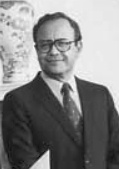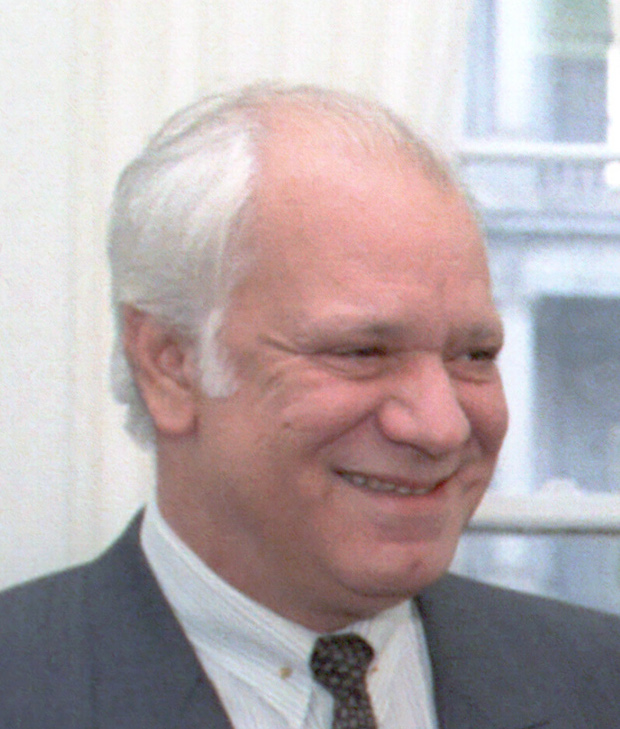|
Arturo Cruz
Arturo José Cruz Porras (December 18, 1923 – July 9, 2013), sometimes called Arturo Cruz Sr. to distinguish him from his son, was a Nicaraguan banker and technocrat. He became prominent in politics during the Sandinista (FSLN) era. After repeatedly resigning from positions in protest, opinion divided between those who lauded him as a statesman and man of principle, and those who derided him as an ineffectual hand-wringer. Somoza opponent Cruz grew up in Jinotepe, Nicaragua. His father Arturo Cruz Sánchez despised Anastasio Somoza García, despite the family's traditional Liberal loyalties. Cruz graduated from the military academy in 1944, but refused his commission rather than serve Somoza's dictatorship. He went on to attend Georgetown University in the United States. Cruz participated in a 1947 coup plot against Somoza, for which he was imprisoned for four months. After joining the April Rebellion of 1954, together with his brother-in-law, Adolfo Báez Bone, and Pedro ... [...More Info...] [...Related Items...] OR: [Wikipedia] [Google] [Baidu] |
Insurrection
Rebellion, uprising, or insurrection is a refusal of obedience or order. It refers to the open resistance against the orders of an established authority. A rebellion originates from a sentiment of indignation and disapproval of a situation and then manifests itself by the refusal to submit or to obey the authority responsible for this situation. Rebellion can be individual or collective, peaceful (civil disobedience, civil resistance, and nonviolent resistance) or violent (terrorism, sabotage and guerrilla warfare). In political terms, rebellion and revolt are often distinguished by their different aims. While rebellion generally seeks to evade and/or gain concessions from an oppressive power, a revolt seeks to overthrow and destroy that power, as well as its accompanying laws. The goal of rebellion is resistance while a revolt seeks a revolution. As power shifts relative to the external adversary, or power shifts within a mixed coalition, or positions harden or soften on ... [...More Info...] [...Related Items...] OR: [Wikipedia] [Google] [Baidu] |
Military Advisor
Military advisors, or combat advisors, advise on military matters. Some are soldiers sent to foreign countries to aid such countries with their military training, organization, and other various military tasks. The Foreign powers or organizations may send such soldiers to support countries or insurgencies while minimizing the risks of potential casualties and avoiding the political ramifications of overtly mobilizing military forces to aid an ally. European advisors during the American Revolution The French Marquis de Lafayette and the German/Prussian Baron von Steuben offered key assistance to the Continental Army during the American Revolutionary War of 1775–1783. Soviet military advisors The Soviet Union deployed military advisors in (for example) Spain, China and Angola, where "The 1976 treaty of friendship and cooperation provided for Soviet-Angolan military cooperation in strengthening the mutual defense capacity. Moscow immediately provided weaponry and supplies, and so ... [...More Info...] [...Related Items...] OR: [Wikipedia] [Google] [Baidu] |
Special Forces (United States Army)
The United States Army Special Forces (SF), colloquially known as the "Green Berets" due to their distinctive service headgear, are a special operations force of the United States Army. The Green Berets are geared towards nine doctrinal missions: unconventional warfare, foreign internal defense, direct action, counterinsurgency, special reconnaissance, counterterrorism, information operations, counterproliferation of weapons of mass destruction, and security force assistance. The unit emphasizes language, cultural, and training skills in working with foreign troops; recruits are required to learn a foreign language as part of their training and must maintain knowledge of the political, economic, and cultural complexities of the regions in which they are deployed. Other Special Forces missions, known as secondary missions, include combat search and rescue (CSAR), counter-narcotics, hostage rescue, humanitarian assistance, humanitarian demining, information o ... [...More Info...] [...Related Items...] OR: [Wikipedia] [Google] [Baidu] |
Adolfo Calero
Adolfo Calero Portocarrero (December 22, 1931 – June 2, 2012) was a Nicaraguan businessman and the leader of the Nicaraguan Democratic Force, the largest rebel group of the Contras, opposing the Sandinista government. Calero was responsible for managing the bank accounts into which money was deposited and then used to buy supplies and arms for the Contras. He was brought to testify at hearings of the US Congress in May 1987. Early years Calero was born on December 22, 1931 in Managua to Adolfo Calero Orozco (1899–1980) and María Portocarrero (1911–1944), who had married in 1927. The oldest of four children, he studied in the United States, graduating from University of Notre Dame in 1953 and Syracuse University. In Managua, he managed the Coca-Cola bottling plant. Calero was associated with the Conservative Party of Nicaragua. From 1963, he was a CIA information source. Before the 1979 overthrow of the government of Anastasio Somoza, he had been briefly imprisoned, ... [...More Info...] [...Related Items...] OR: [Wikipedia] [Google] [Baidu] |
Nicaraguan Democratic Force
The Nicaraguan Democratic Force (', or FDN) was one of the earliest Contra groups, formed on August 11, 1981 in Guatemala City. It was formed to oppose Nicaragua's revolutionary Sandinista government following the 1979 overthrow of Anastasio Somoza Debayle. It merged the 15th of September Legion, which comprised mostly former members of Somoza's National Guard, with the Nicaraguan Democratic Union, an organization of émigrés from the business and professional classes. The new FDN also began assimilating the MILPAS movement, bands led by disenchanted former MAP-ML guerrillas. The FDN military was under the command of former National Guard colonel Enrique Bermúdez. The FDN was heavily backed by the Central Intelligence Agency and the Reagan administration. Famous commanders These are some of the FDN's better-known ''comandantes'': *Suicida – ''Pedro Pablo Ortiz Centeno''. Former Guard sergeant, operated in the Jalapa area. Legendary for his eagerness for battle, but never f ... [...More Info...] [...Related Items...] OR: [Wikipedia] [Google] [Baidu] |
Alfonso Robelo
Luis Alfonso Robelo Callejas (born October 11, 1939),is a Nicaraguan businessman, was the founder of the Nicaraguan Democratic Movement (MDN). Early life and education Luis Alfonso Robelo Callejas was born in Leon, Nicaragua on October 11, 1939. He grew up in a wealthy family and inherited a profitable vegetable oil company. He earned a degree in chemical engineering at Rensselaer Polytechnic Institute in Troy, New York in 1961. He is a member of the Latino fraternity Phi Iota Alpha, the oldest inter-collegiate Greek-letter organization established for Latino Americans. Career Robelo was rector of the University of Central America from 1970 to 1972 and President of the Nicaraguan Chamber of Commerce until 1975. He then headed the Nicaraguan Development Institute, long active in the development of independent agricultural and small business cooperatives. Political engagement Following the assassination of ''La Prensa'' editor Pedro Joaquin Chamorro Cardenal in 1 ... [...More Info...] [...Related Items...] OR: [Wikipedia] [Google] [Baidu] |
United Nicaraguan Opposition
The United Nicaraguan Opposition (''Unidad Nicaragüense Opositora'', UNO) was a Nicaraguan rebel umbrella group formed in 1985, led by the triumvirate of Adolfo Calero, Alfonso Robelo, and Arturo Cruz. However, the great majority of UNO's military forces came from Calero's Nicaraguan Democratic Force (FDN), and throughout its two-year existence Robelo and Cruz complained that Calero treated them as figureheads rather than equals. Generally, the CIA backed Calero in these struggles, while Elliott Abrams and the State Department The United States Department of State (DOS), or State Department, is an executive department of the U.S. federal government responsible for the country's foreign policy and relations. Equivalent to the ministry of foreign affairs of other nat ... backed Robelo and Cruz. In January 1987, Cruz informed Abrams of his intention to resign. In a bid to prevent this, Abrams pushed Calero into resigning in mid-February, but Cruz left on March 9. With Cru ... [...More Info...] [...Related Items...] OR: [Wikipedia] [Google] [Baidu] |
Contras
The Contras were the various U.S.-backed and funded right-wing rebel groups that were active from 1979 to 1990 in opposition to the Marxist Sandinista Junta of National Reconstruction Government in Nicaragua, which came to power in 1979 following the Nicaraguan Revolution. Among the separate contra groups, the Nicaraguan Democratic Force (FDN) emerged as the largest by far. In 1987, virtually all Contra organizations were united, at least nominally, into the Nicaraguan Resistance. During their war against the Nicaraguan government, the Contras committed numerous human rights violations and used terrorist tactics. These actions were frequently carried out systematically as a part of the strategy of the Contras. Supporters of the Contras tried to downplay these violations, particularly the Reagan administration in the U.S., which engaged in a campaign of white propaganda to alter public opinion in favor of the Contras, while covertly encouraging the Contras to attack ... [...More Info...] [...Related Items...] OR: [Wikipedia] [Google] [Baidu] |
Election Boycott
An election boycott is the boycotting of an election by a group of voters, each of whom abstains from voting. Boycotting may be used as a form of political protest where voters feel that electoral fraud is likely, or that the electoral system is biased against its candidates, that the polity organizing the election lacks legitimacy, or that the candidates running are very unpopular. In jurisdictions with compulsory voting, a boycott may amount to an act of civil disobedience; alternatively, supporters of the boycott may be able to cast blank votes or vote for "none of the above". Boycotting voters may belong to a particular regional or ethnic group. A particular political party or candidate may refuse to run in the election and urges its supporters to boycott the vote. In the case of a referendum, a boycott may be used as a voting tactic by opponents of the proposition. If the referendum requires a minimum turnout to be valid, the boycott may prevent this quorum being ... [...More Info...] [...Related Items...] OR: [Wikipedia] [Google] [Baidu] |
Coordinadora Democrática Nicaragüense
The Coordinadora Democrática Nicaragüense (''Democratic Coordinating Committee'', CDN) was a coalition of three right-wing Nicaraguan parties which boycotted the 1984 Nicaraguan general election. The parties were the Social Christians, the (right-wing) Social Democrats, and the Constitutional Liberal Party.Smith, Hazel. Nicaragua: self-determination and survival. London : Pluto Press. 1993. Pp. 149. See also * National Opposition Union * Arturo Cruz Arturo José Cruz Porras (December 18, 1923 – July 9, 2013), sometimes called Arturo Cruz Sr. to distinguish him from his son, was a Nicaraguan banker and technocrat. He became prominent in politics during the Sandinista (FSLN) era. After repe ... References Defunct political parties in Nicaragua Political party alliances in Nicaragua 1984 in Nicaragua {{Nicaragua-stub ... [...More Info...] [...Related Items...] OR: [Wikipedia] [Google] [Baidu] |



